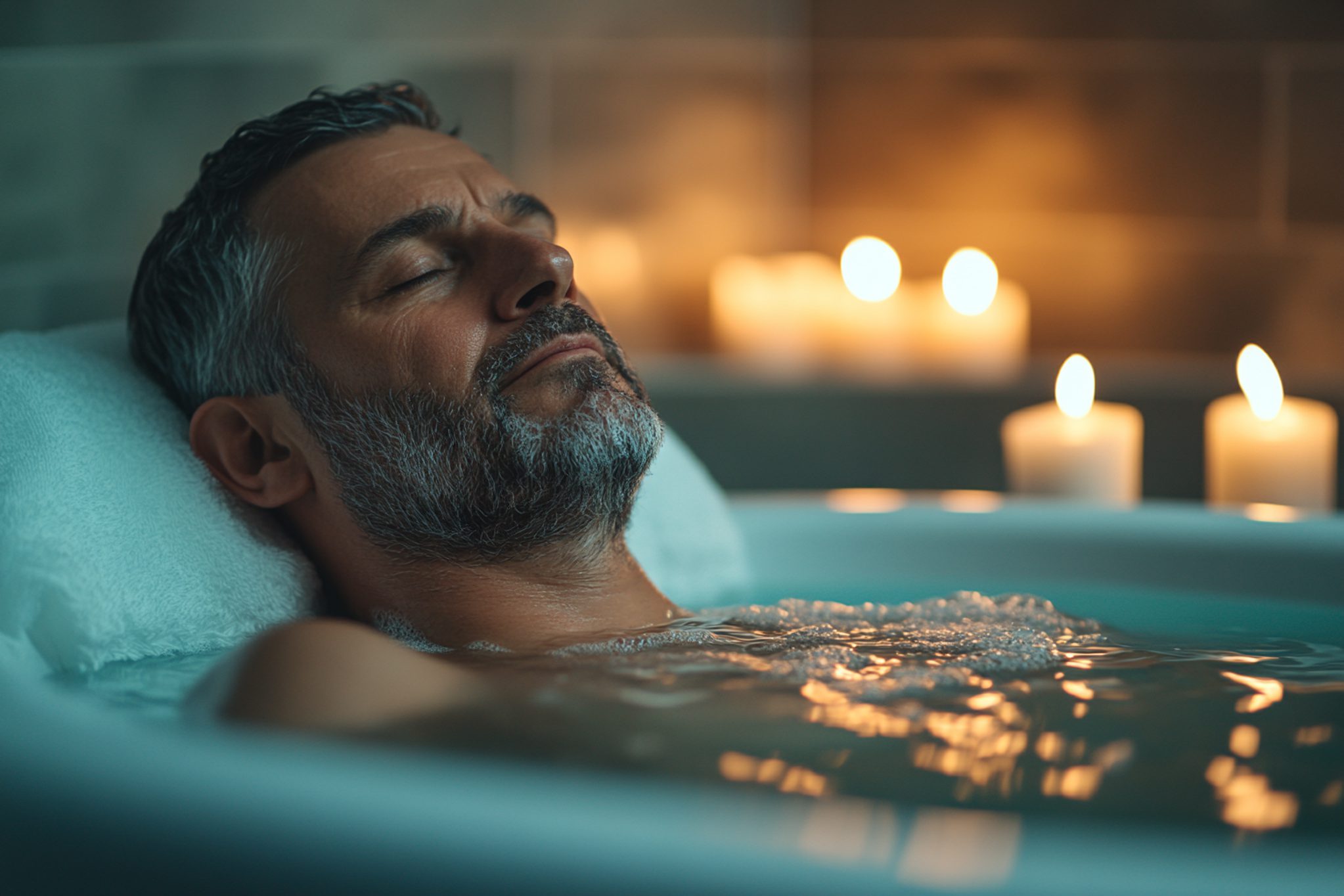
Hot Baths and Sleep Quality: The Relationship Between Warmth and Relaxation
Uncover the science behind it and practical tips for best results.

Imagine sinking into a hot bath at the end of a long day. The steam rises, your muscles relax, and for a brief time, the stresses of the day fade away. Now, imagine if this evening ritual could also help you sleep better. Sounds too good to be true, right? Well, it's not.
Sleep quality is something we all crave but often struggle to achieve. With the hustle and bustle of modern life, finding effective and enjoyable ways to improve our sleep is more important than ever. But don't worry. We have an incredible solution to all your sleep worries and hot baths. It is a simple yet powerful tool to enhance relaxation and sleep quality.
In this article, we'll discuss the relationship between hot baths and sleep quality, uncovering the science behind it and offering practical tips to incorporate this soothing practice into your nightly routine.
The Science Behind Hot Baths and Sleep Quality
When it comes to understanding why hot baths can improve sleep quality, it all comes down to body temperature and its role in regulating our sleep-wake cycle.
Our bodies have an internal clock known as the circadian rhythm, which influences various physiological processes, including sleep. One key aspect of this rhythm is the fluctuation of our core body temperature. Typically, our body temperature drops slightly in the evening, signaling to our brain that it's time to wind down and prepare for sleep.
When you soak in a warm bath, your body temperature initially rises. This might sound counterproductive, but it's the subsequent drop in temperature that does the trick. After you step out of the bath, your body begins to cool down rapidly, mimicking the natural evening temperature decline and sending a powerful signal to your brain that it's time to sleep.
Research has shown that a warm bath taken about 2 hours before bedtime can improve sleep onset, duration, and quality. One study published in the journal Sleep Medicine Reviews found that participants who took hot baths before bed not only fell asleep faster but also enjoyed a deeper, more restful sleep.
Additionally, warm baths can help reduce the levels of cortisol, the stress hormone, promoting a more relaxed state conducive to sleep. So, the next time you're thinking about skipping your nightly bath, remember: it's not just about cleanliness; it's a science-backed ticket to better sleep!
Benefits of Hot Baths for Sleep Quality
There's nothing quite like a hot bath to melt away the stresses of the day. But did you know that this simple self-care offers many benefits for your sleep quality?
Physical Relaxation
As the warm water envelops your body, it helps to soothe sore muscles and joints. This physical relaxation is particularly beneficial if you've been hunched over a computer all day or hit the gym a little too hard. By easing muscle tension, a hot bath can prepare your body for a more comfortable and restful night's sleep.
Mental Well-Being
But the benefits of hot baths aren't just skin-deep. They also work wonders for your mental well-being. Taking time for a hot bath is a form of mindfulness—a moment to disconnect from the constant barrage of emails, notifications, and to-do lists. This mental break can significantly reduce stress and anxiety levels, which are often culprits of poor sleep quality.
Well-Maintained Sleep Cycle
Moreover, hot baths can help regulate your sleep cycle by encouraging a smoother transition into sleep. The warmth of the bath increases blood circulation and promotes the release of endorphins, those feel-good hormones that enhance your mood.
So, whether you're looking to unwind physically or mentally, incorporating hot baths into your nightly routine can be a game-changer for your sleep quality. It's a win-win situation: you get to indulge in a relaxing bath and reap the benefits of a better night's sleep!
How to Take an Effective Hot Bath for Better Sleep?
Taking a hot bath sounds simple enough—just turn on the tap and hop in, right? Well, there's a bit more to it if you want to maximize the sleep-enhancing benefits.
Right Time to Take a Hot Bath
According to research, the best time to take a hot bath is about 2 hours before you plan to go to bed. This allows enough time for your body to cool down after the bath, signaling to your brain that it's time to sleep.
The Right Temperature of the Water
While it might be tempting to crank up the heat, the ideal water temperature for a sleep-inducing bath is around 104-109°F (40-43°C). This range is warm enough to relax your muscles without causing overheating or discomfort. Aim to soak for about 20-30 minutes. This duration is perfect for unwinding without overdoing it.
Add Calming Elements
To enhance the relaxing effects of your bath, consider adding some calming elements. Aromatherapy can be particularly effective—try adding a few drops of lavender or chamomile essential oil to the water. These scents are known for their soothing properties and can further help in reducing stress and promoting relaxation.
Lighting
Lighting also plays a significant role. Dim the lights or use candles to create a serene atmosphere. Harsh lighting can be jarring and counterproductive to the relaxing experience. Soft, ambient light helps in calming the mind and preparing it for sleep.
Gentle Music
Lastly, consider incorporating some gentle music or nature sounds. The right soundtrack can elevate your bath from a simple soak to a full-on spa experience. Choose calming tones or sounds of nature, like ocean waves or rain, to help quiet your mind.
By paying attention to these details, you can turn a regular bath into a powerful sleep-enhancing ritual. Remember, the goal is to create a relaxing environment that promotes both physical and mental relaxation, setting the stage for a night of restful and rejuvenating sleep.
FAQ
Are there specific bath additives that enhance sleep quality?
Yes. Adding ingredients like Epsom salts, lavender essential oil, or chamomile can promote deeper relaxation. These natural additions support stress relief and help calm the body and mind, making it easier to transition into restful sleep.
Is there an optimal water temperature for a pre-sleep bath?
Yes. Water around 104–109°F (40–43°C) is ideal. This range is warm enough to raise your body temperature, which then cools down after the bath—signaling the brain it's time for sleep and helping to align with your natural circadian rhythm.
Can hot baths help with sleep during hot weather?
Yes. While it may sound counterintuitive, a warm bath in hot weather can still promote better sleep. After the bath, your body cools down quickly, helping you feel sleepy. This cooling effect mimics your body’s natural nighttime temperature drop.
Do hot baths have cardiovascular benefits that relate to sleep?
Yes. Hot baths can improve blood circulation, lower blood pressure, and relax the heart rate—all of which contribute to deeper, more restorative sleep. A relaxed cardiovascular system helps the body settle into rest more efficiently.
Can taking a hot bath before bed help reduce nighttime awakenings?
Yes. A warm bath promotes deeper sleep and can help reduce the number of times you wake up during the night. It prepares the body for rest by relaxing muscles, lowering stress, and stabilizing core temperature throughout the sleep cycle.
Is it advisable to take a hot bath immediately before bed?
Not quite. It’s best to take a warm bath about 90 minutes before bedtime. This gives your body enough time to cool down after the bath, which is necessary for sleep to begin. A cooler core temperature helps signal the body to wind down.
Can hot baths be beneficial for individuals with chronic pain affecting sleep?
Yes. Soaking in warm water soothes sore muscles and joints, which can ease discomfort that disrupts sleep. For those with conditions like arthritis or fibromyalgia, hot baths can serve as a gentle, natural way to prepare the body for rest.

Written by
Dr Aqsa
As a Medical Doctor, Dr Aqsa, uses her knowledge to craft complex medical information that is understandable to the general public. For years, she has tried to improve health literacy and empower readers with valuable health knowledge through her articles, blog posts, and educational materials.
Download Pillow
Get help
Press & News
Legal
Connect
X (Twitter)
Company
Copyright © Neybox Digital Ltd.



